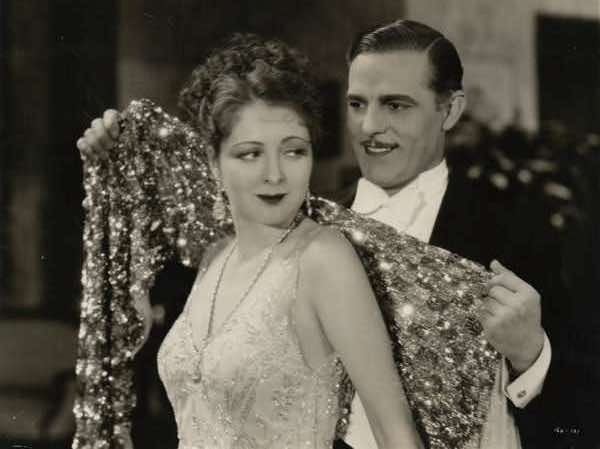CAREERS
(Fiamme di passione)
John Francis Dillon (US 1929)
Errors in contemporary newspapers and journals together with the AFI Catalog have led to a great deal of misinformation about Careers, a film generally listed as lost (the sound version remains missing). Karriere, the German play on which it is based, by Paul Rosenhayn and Alfred Schirokauer, was published in 1914 and not 1924, as proven by a document in the Schirokauer Collection housed at the Leo Baeck Institute in New York, as well as a copy of the play in the Trostel Collection of German Theater Scripts in Milwaukee. Karriere is the only known literary collaboration between the two authors, both of whom had significant careers as writers for German silent cinema. In 1924 the Berlin publishers Oesterheld & Co. sold the film rights to an unnamed American company for the paltry sum of $400, of which $288 went to the authors (the receipt is in the Schirokauer Collection).
Sometime in 1928 the popular playwright Zoë Akins was at work on an adaptation of the drama, though whether initially intended for theatre or screen requires further research. Under the new title South of Siam, the play went into rehearsals in late November that year, with Rachel Crothers directing. At some point Crothers was replaced by Lawrence Marston, and producer Lee Shubert brought the production back into rehearsals in late April 1929. The premiere in Wilmington, Delaware, was followed by performances in Philadelphia, all in the hopes of bringing it to Broadway. Unfortunately, extravagant sets couldn’t compensate for poor dialogue (Variety reported that some lines unintentionally provoked laughter), and the show never made it to New York.
Meanwhile, First National announced in late January 1929 that Billie Dove would star in Careers, her first all-sound Vitaphone film – no mention was made of the Akins play. Shortly thereafter, John Francis Dillon was signed to direct (he’d worked with Dove one year earlier on The Heart of a Follies Girl), and production began on 11 February in Burbank, California. Editing was underway by early April, before Akins’ stage version premiered to largely negative reviews, and the film was released in June. The only critique I found mentioning both the play and the film comes from the Philadelphia Inquirer: “As a whole, the picture is not so irritating as its stage sister and the suspense is more carefully nursed and maintained.”
The story is set in a semi-remote outpost of Indochina, where the French government’s Resident (not “President,” as often cited in contemporary reviews and the AFI Catalog) promotes only those men whose attractive wives are willing to sacrifice their honor for their husbands’ advancement. Although Helene Duval (many sources give the surname as Gromaire, but the cast list on the print is quite clear) is just as desperate as her husband Victor to get out of this backwater, she’s not ready to go that far; the Resident is murdered, with suspicion falling on one of the colony’s European women. On the film’s release, several critics assumed its Southeast Asia setting and potentially vengeful Caucasian woman were trading on the success of W. Somerset Maugham’s The Letter, but of course the Rosenhayn and Schirokauer play predated all of Maugham’s versions by some years.
The surviving element of Careers in the Cineteca Italiana is from the silent version, with English flash intertitles that have now been stretched; opening and closing titles are lacking. In addition, two characters have sadly been edited out completely: Carmel Myers appeared in one sequence towards the beginning, as an ex-mistress of the Resident, and sang one song, “I Love You, I Hate You,” by George W. Meyer and Al Bryan, but nothing of her part or the song remains except the sheet music. Also missing from the surviving print is Kithnou, a Pondicherry-born dancer. Still to be seen however is Spanish basso Andrés de Segurola, performing an as-yet unidentified French aria, and two Russian nobles, Princess Natacha Golitzin and General Alexander Ikonikoff, both extras in the grand party sequence.
I suspect some injudicious editing of the surviving print hampered the build-up of suspense in the finale, which ends too abruptly. Careers is the second of six Billie Dove titles shot by John Seitz, who certainly knew how to show the star to best advantage (assisted by Max Rée’s costumes); less successful was Forrest Halsey’s dialogue, roundly criticized in the press. Everyone agreed that Dove’s voice was well-suited to talkies, but the repetition of “won’t you sit down?” three times elicited derisive laughs. Also condemned by some was the attempted rape scene between the Resident and Helene, which the Brooklyn Daily Eagle called, “…in disgustingly bad taste. It is exhibitions of this sort which must inevitably bring about a more rigid movie censorship.” Vitaphone discs for the Spanish release version survive, and are posted online, on both the “Vitaphone Varieties” blog and YouTube, but they are only musical tracks; a Spanish song seems to replace Segurola’s aria.
Jay Weissberg

scen: Forrest Halsey, dal dramma di/based on the play by Paul Rosenhayn, Alfred Schirokauer, Karriere (Berlin, 1914).
did/titles: Paul Perez.
photog: John Seitz.
mont/ed: John Rawlins.
scg/des: Jack Okey.
cost: Max Ree [Rée].
cast: Billie Dove (Helene Duval), Antonio Moreno (Victor Duval), Thelma Todd (Hortense Lacombe), Noah Beery (The Resident), Carmel Myers (Madame Andre), Holmes Herbert (M. Carouge), Robert Frazer (M. Lavergne), Andre [Andrés] de Segurola (Signor de Segurola), Sojin (The Native), Robert Haines (The Governor), Robert Schable, Craufurd [Crauford] Kent, Kithnou, Marte Faust, Princess Natacha Golitzin [Natalya Galitzine], General Alexander Ikonikoff, Rollins Morryama [Rollin Moriyama, Ryoichi Moriyama], Mike Morrita [Miki Morita].
prod: Ned Marin, First National; pres. Richard A. Rowland.
dist: First National.
uscita/rel: 02.06.1929.
copia/copy: versione muta/silent version; DCP, 63′; did./titles: ENG.
fonte/source: Cineteca Italiana, Milano.


 Italiano
Italiano